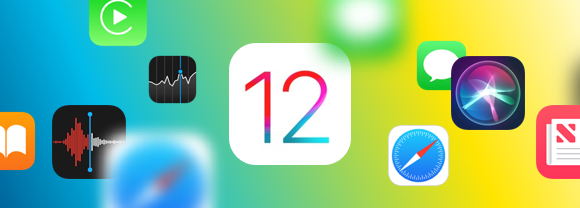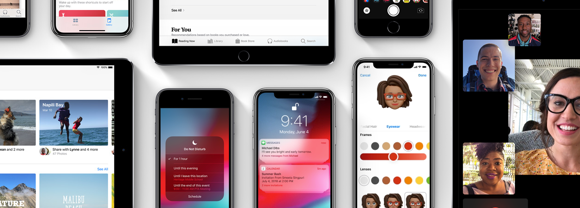Since the day that Steve Jobs launched the iPod (way back in 2001) with the slogan “1,000 Songs in Your Pocket” we have become accustomed to Apple making major product and operating systems each year. In that time we have seen Apple continually change the game with the launch of the iPhone, iPad, Apple Watch and a series of new features that continue to enhance the way we interact and experience our devices.
This year has been no exception, with Apple recently releasing a new operating system (iOS 12) and three new iPhone models (XS, XS Max and XR). With every announcement comes a lot of cool new features to play with. However, if you have developed, or are responsible for, one of the more than 2 million apps currently available on the App Store then you need to make sure your app is still compliant and operational. This is even more critical as iOS 12 has come on the back of some major changes from Google and Facebook that have had a significant impact on apps that utilise their services.
With Apple, we have come accustomed to big announcements and focusing on the shiny things, and not the details. So to take a leaf out of their book let’s have a look at the cool features before we get into the detail of what this could mean for your app.
Six of the Best iOS 12 Updates
1.Grouped Notifications
If you have ever walked away from your phone in the middle of a group chat you will know that feeling of coming back to a screen full of notifications. With this update all of those notifications will be grouped under a single thread, which may seem small but that feeling of less clutter will be immense.
2.Group Facetime
Apple have taken group chat to the next level, allowing you to Facetime with up to 32 people at once. Great if you have a large circle of friends or for family catch ups.
3.Screen Time
If you have ever wondered how much time you actually do spend scrolling through your Facebook or Instagram feed the new Screen Time feature is for you. This will give you a breakdown of how much time you have spent on your phone, where you have spent that time and how that compares to your average. It also includes the ability for you to set limits on your use as well as integrating with Family Sharing to allow parents to monitor their kids usage.
4.Increased Privacy
We all love sharing our data when it tells us there is a traffic jam on the way to work, but there can also be a downside. This is an area that we at Dapper have noticed is an ever increasing focus for Apple, with limitations on what data you can capture from users of your app becoming even more stringent. With iOS 12 Apple have added features such as the ability to automatically generate a strong password and store this so it can automatically be populated across any of your Apple devices. They have also added the ability to automatically fill-in those security codes you receive via SMS (such as when you are authorising a new bank transaction). No need to try and remember those 6 digit codes while you are switching between apps.
5.Improved Performance
Every operating system update promises improved performance, but what makes this one unique is that it will significantly improve the performance of older iPhone’s. Apple have promised that access to the camera will be increased by 70%, keyboard appearance will be improved by 50% and apps will launch twice as fast when under a heavy load.
6.Siri Shortcuts
Apple first introduced Siri in 2011 (I bet you find that hard to believe) and to be honest it really hasn’t offered much more than novelty value and the ability to make hands free calls while driving. With iOS 12 there are indications that this might change through the introduction of Shortcuts.
If you have ever gone to search for an app and wondered how your phone knows to suggest the Facebook app at 8pm, after the kids have gone to bed and you finally get to have some me time then you are already familiar with Siri Shortcuts. With iOS 12 you can create your own voice commands to trigger actions in your apps as well as making use of the shortcuts Siri will automatically create for you. Also look out for shortcuts appearing within your favourite apps.
The Fine Print…
Now that we have had a look at some of the shiny new things in iOS 12 (and there are plenty more than the list above) let’s dive in to how implementing a major operating system upgrade will impact your app.
To start with it is a safe assumption that your users will update to iOS 12. Apple are very good at pushing people to update, achieving upwards of 85% adoption for iOS 11. The majority of your users will be on iOS 12, so your app needs to be compliant.
When iOS 11 and the iPhone X was released we saw a range of issues, from misalignment which prevented users from using the menu (facebook was one) through to apps that just down right didn’t work. The early reports are that you can expect more of the same with iOS 12, with some of the world’s largest apps reporting problems. According to Gadget Hack during beta testing of iOS 12 they discovered the following issues:
- Google Maps – search bar shrinking and inaccurate GPS
- Netflix – Continually loading, crashing on login or when downloading a video
- Runkeeper – Inaccurate GPS and unstable on iPhone X
- Twitter – Blank screen upon login
- Audible – Crashes
- HSBC – Crashes
- Nike+ Fuel – Crashes
- Waze – Unable to accept the updated privacy policy so unable to use the app
It is clear that not even the world’s biggest apps are immune to the issues a major system can cause. Unfortunately, the general public probably won’t understand that the reason why your app no longer works is because Apple has updated the operating system. So if you want to avoid a flood of 1 star reviews the best defence is to proactively test and update your app. You are better off discovering any issues before your app users do.
Not Just Apple
In typical Apple fashion they make a big event out of updates to their platform, but equally important is the recent changes that both Google and Facebook have implemented to their services.
Google Maps has recently implemented significant changes to their pricing plans and required everyone (even if you are using the free service) to provide payment details and update the API key. Without this, the map functionality will no longer work, obviously significantly impacting the experience of your users.
Google is also behind the Android operating system, which is currently in the process of rolling out Android Pie. This will initially come to the suite of Google Pixel devices but will quickly be adopted by the major Android manufacturers. If you have developed an Android app you would no doubt be aware of the fact that the wider range of Android devices and the more dispersed adoption of operating systems (in contrast to Apple you need to cover 6 different versions of the operating system to cater for 85% of Android users), which can cause a number of challenges. While the impact of Android Pie isn’t as well known as iOS 12 it will pay to be prepared.
In light of the recent Cambridge Analytica controversy facebook has implemented some significant changes to how apps can utilise their services, primarily to provide tighter privacy measures. This has included more stringent review and approval processes for anyone utilising the facebook API, changes to facebook login (which would have to be one of the most widely used services in the app world) and a host of other API changes. If you use the facebook API’s within your app then it is highly likely to be fairly baked in to the user experience, and therefore critical that your app is updated.
What To Do Next?
If you have an iOS and Android app it is essential that you test your app with the new operating systems, both at a code level and from a user perspective, in order to identify and rectify any issues before your users start sending you negative feedback. If your app also utilises Google Maps or the facebook API then there is a high likelihood that it already isn’t operating as it should.
If you would like to discuss how Dapper can assist you to test, and fix your apps, contact us today for a free consultation.

